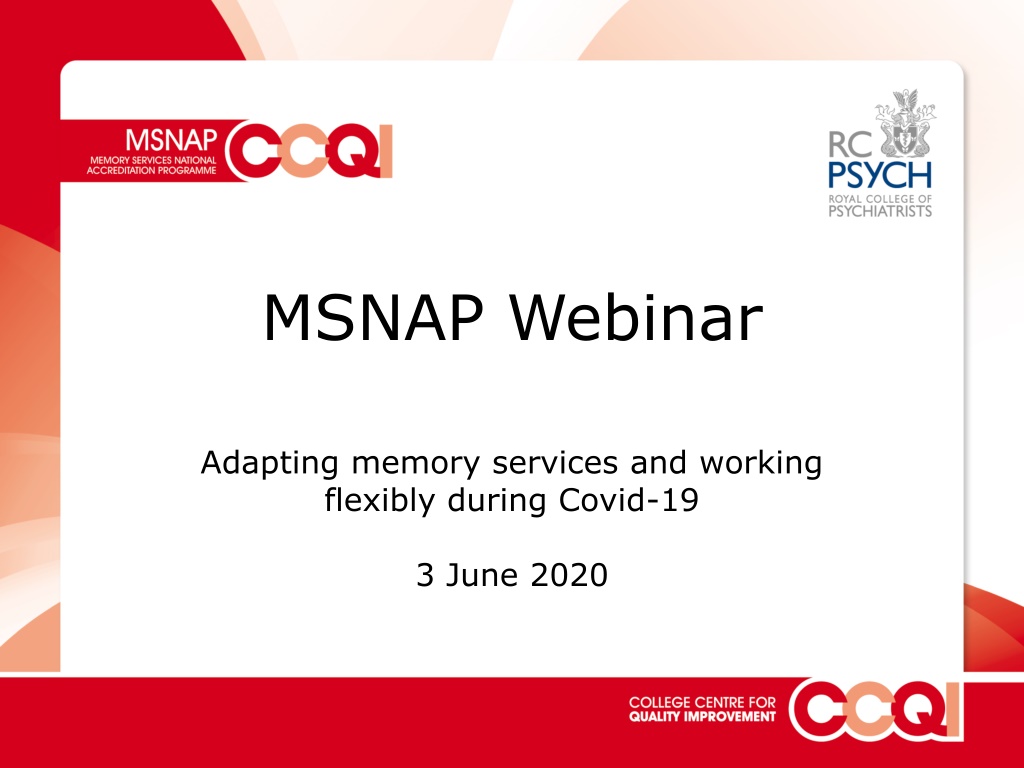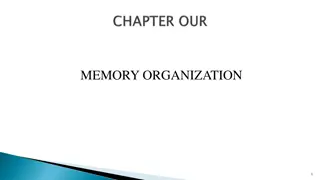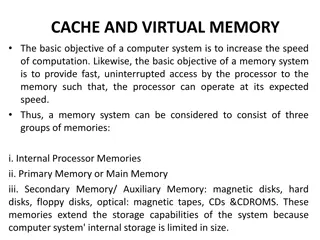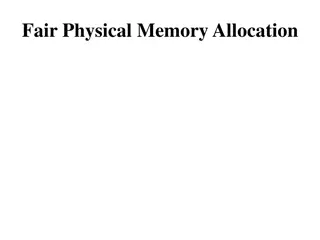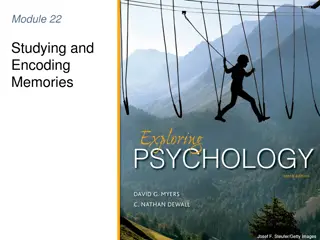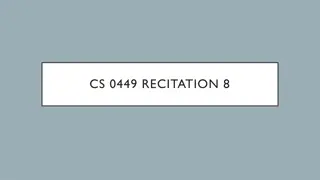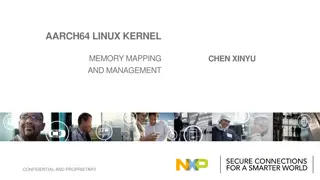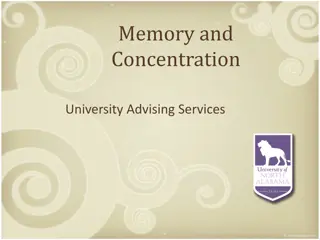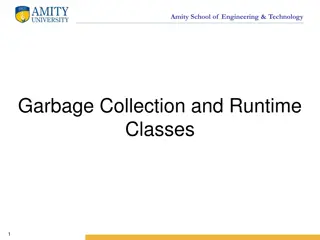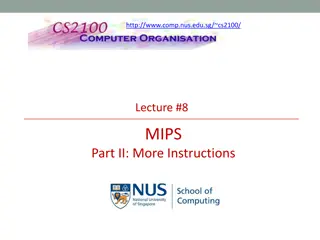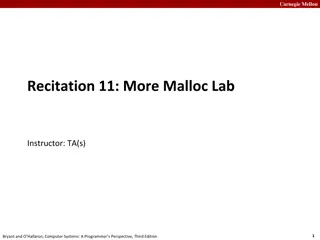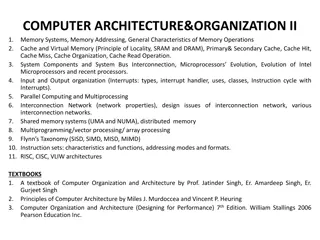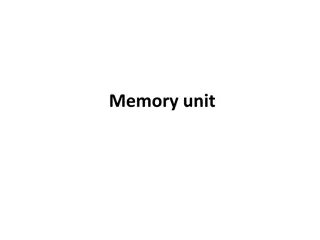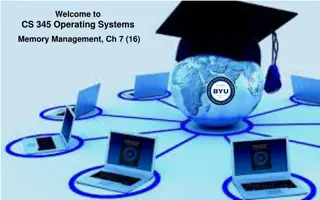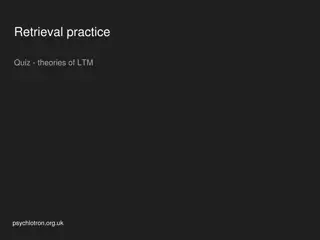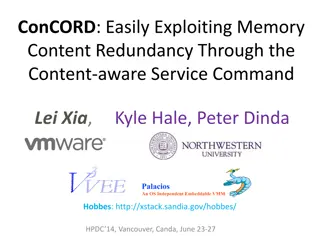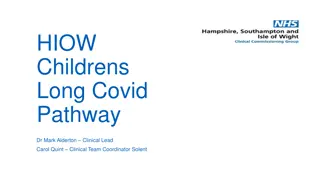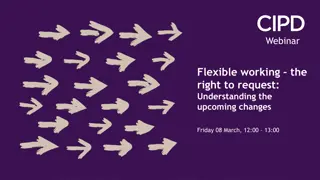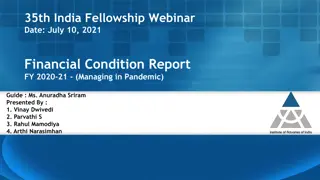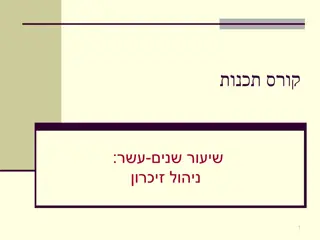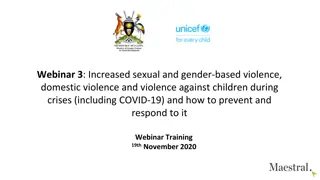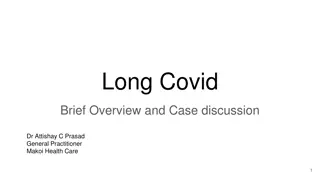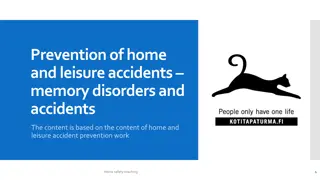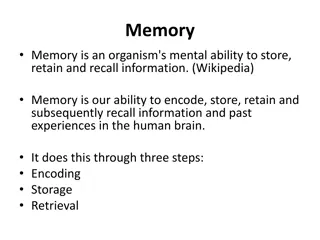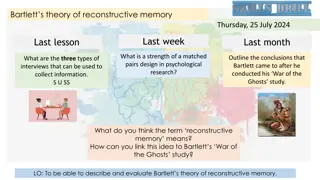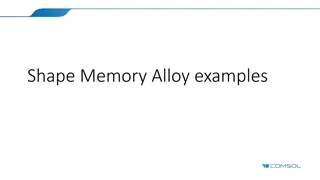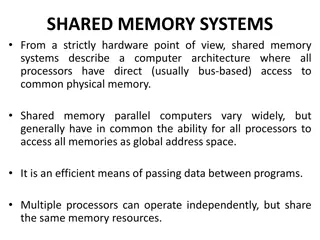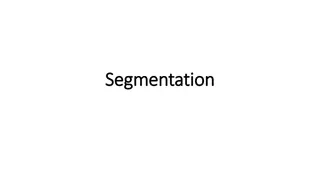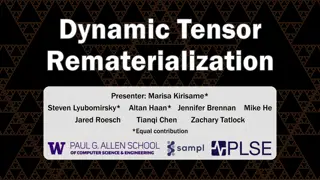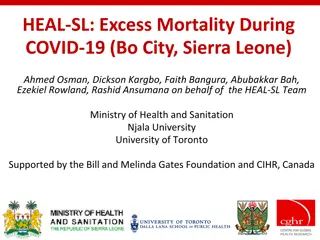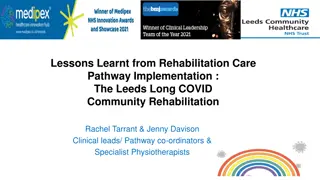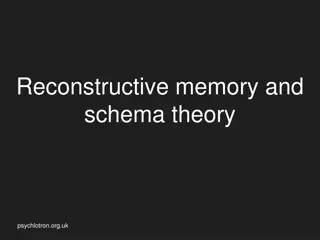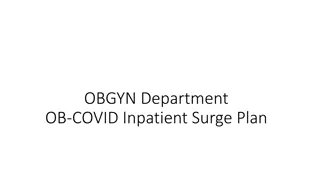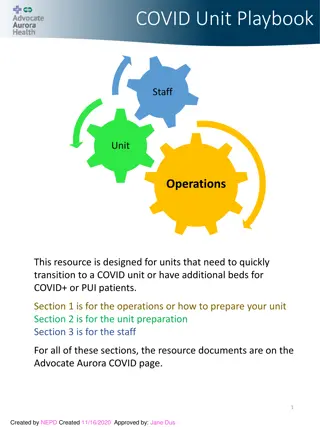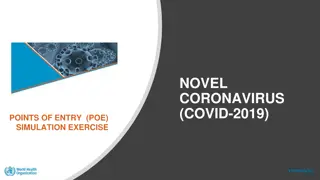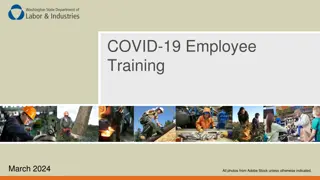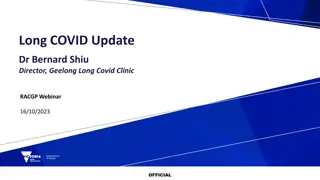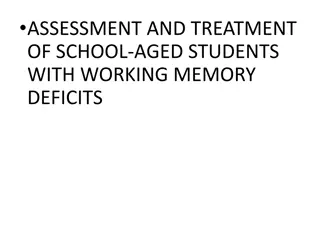Adapting Memory Services and Working Flexibly During Covid-19 Webinar Insights
Dr. Sarah Ghani, Dr. Chris Jagus, and Dr. Sabrina Leigh-Hunt shared valuable insights on adapting memory services during the COVID-19 crisis. They discussed pros and cons of maintaining business as usual, innovative strategies implemented, and adjustments made to ensure continued quality care while working flexibly. Strategies included reviewing care pathways, ensuring staff had necessary IT equipment, and implementing remote team huddles via Microsoft Teams.
Download Presentation

Please find below an Image/Link to download the presentation.
The content on the website is provided AS IS for your information and personal use only. It may not be sold, licensed, or shared on other websites without obtaining consent from the author. Download presentation by click this link. If you encounter any issues during the download, it is possible that the publisher has removed the file from their server.
E N D
Presentation Transcript
MSNAP Webinar Adapting memory services and working flexibly during Covid-19 3 June 2020
Housekeeping This is a live event, therefore unless you re a designated speaker you are on mute Please use the Q&A function to ask any questions and vote for the ones you want answered This will be recorded and the link will be shared after the event If you have requests or suggestions for future webinars please let us know
Dr Sarah Ghani Chair of MSNAP Advisory Group & Consultant Clinical Psychologist West London Trust
Dr Chris Jagus Consultant in Old Age Psychiatry Isle of Man
Dr Sabrina Leigh-Hunt Consultant Psychiatrist Margaret Cooper Memory Service Nurse Prescriber Tees Esk & Wear Valleys NHS Foundation Trust
Delivering Memory Services during COVID Crisis at Hambleton and Richmondshire Memory Clinic Dr S Leigh-Hunt, Consultant In Old Age Psychiatry and Margaret Cooper, Memory Service Nurse Prescriber
Pros and Cons of Business as usual Pros Avoiding waiting times for patients. Cons Risk of reducing quality of the diagnostic process Reducing anxiety for patients and relatives Developing two tier system not everyone will be suitable for remote assessment Identifying and addressing risks Physical observations (pulse, BP, ECG) Developing safe and effective new ways of working ( retrospect) Missing aspects of risk through remote working
What we did? Reviewed Trust Dementia Care Pathway and added modifications to support continued delivery of assessments and treatment. Reviewed IT equipment / software early on and identified and ensured staff had appropriate IT requirement laptops, mobile telephones, headphones. Staff resources number of staff at base and working remotely reduced to ensure social distancing was possible- team meeting. Established huddles via Microsoft teams
Prior to appointment Patients are screened to ensure that they can either participate in attend anywhere or telephone assessment. Consent is obtained to talk to carers/relatives. This streamlines the assessment Information about this service and the third sector is sent out to the patient via post. This includes any services that have been set up in their area in response to Covid 19.
Assessment Live recording Patient and collateral history is the key- consistent team approach for obtaining history. Conscious of obtaining informed consent at every stage of process. Assessment Tools Prior to MDT: any results bloods/ CT/ physical hx and relevant information already checked by medic ready for discussion. MDT discussion- facilitated by remote working. Once assessment completed time slot has been pre-arranged via Microsoft teams with the consultant and another clinician to discuss the assessment and generate a working diagnosis
Diagnostic Feedback Always by a senior clinician with careful attention to consent and emotional reaction. We encourage family members to be present if possible and if not to contact patient straight after. Our clinical psychologist is available for post diagnostic support. We continue to refer to appropriate services both secondary MH services and local support agencies. Appropriate information pack is sent following Diagnostic Discussion.
Commencing Treatment Non Medical Prescriber primarily commences treatment Working closely with primary care to obtain physical observations, and health concerns. Working closely with pharmacies to ensure safe delivery of prescriptions. Review appointments by telephone. Involving patients and carers in self monitoring Home BP machines, pulse monitors- but recognising clinical limitations. Cautious titration .
Cont Weekly NMP supervision with Consultant.
Following Diagnosis Educational session (Living well with memory loss). 1:1 basis instead of group with senior OT . Which includes those who may have struggled to attend the group. Applicable written information sent in the post / email. Carers group OT liaising with 3rd sector service to develop small carers group via Microsoft team. CST / MCI follow a similar pattern to the Living Well Group.
Feedback from Professionals lucky to have some retired senior nurses back .. and this has allowed us to increase the number of initial assessments and working diagnoses have been made by close working with our consultant that the provisional diagnosis can be disclosed to the patient see all these patients face to face to confirm the diagnosis ... TEAM MANAGER we realised that face to face appointments would be impossible .our everyday work needed to continue in some format or we would increase risks further for our patients Although phone appointments have not been suitable for all patients in particular hearing impairment or severe disorientation can rule it out in most cases we have been able to achieve some level of assessment ..MEMORY CLINIC NURSE Keeping an expert admin eye on appointments and follow ups .Attending Huddles .......... everyone is at a safe distance .. Not travelling to other departments/wards unnecessarily .Sending the majority of post to GP s via email (this is much quicker than royal mail at the present time) TEAM SECRETARY As a nurse prescriber I have continued titration appointments Excellent and frequent clinical supervision for prescribing has aided this ..
Staff Reflections Overall a very effective, efficient and win win situation for everyone. It was very beneficial to then be part of the diagnostic feedback given by all on the same day . I think the patient and carer were very reassured to hear our feedback in a timely way .
Clinical Psychology As yet we have not completed any new assessment/ repeat neuropsychometry For those patients assessed joint diagnostic feedback with consultant via attend anywhere Psychologist role in CLS has been maintained weekly Psychologist has been present throughout lockdown to support staff as needed assist with other roles if appropriate.
Constraints and Challenges Training requirements for Professionals Patients who were not assessed remotely- waiting lists Titrations Those who require neurology opinion/other Certainty of Diagnosis Assessing risk accurately relying on information given by patient/ carers. Staff / patients anxiety re: length of time this situation will continue. this present situation will become endemic so we will continue to work differently whilst maintaining standards
Positives Staff ability to adapt and continue to put patient at the centre of everything we do. Staff are feeling less isolated when working at home and continue to be involved in operational decision making. Embracing technology. Using Microsoft Teams for Huddles, Staff support, CLS complex patient care, diagnostic discussions. More staff are able to attend Webinars- good practice being disseminated more efficiently.
Thank you Sharon Airey, Team Manager Dr Venkatesh Muthukrishnan , Clinical Director MHSOP York & North Yorkshire, TEWV Dr. Mani Krishnan Senior Clinical Director MHSOP, TEWV
Dr M Santhana Krishnan Consultant in Old Age Psychiatry/Liaison Psychiatry, Senior Clinical Director MHSOP Trust-wide Tees Esk & Wear Valleys NHS Foundation Trust
Memory clinics during COVID19 Pandemic Challenges and Opportunities DR M SANTHANA KRISHNAN CONSULTANT IN OLD AGE PSYCHIATRY CHAIR ELECT FACULTY OF OLD AGE PSYCHIATRY @RCPSYCH
COVID 19 posed a challenge to our routine memory clinic work Business as usual is not possible neither we can close for business Our Dilemma We used NEED and RISK as a mantra to challenge whatever we did Patients and families were clearly keen to engage in the new way
Memory clinics in COVID Times Enhanced Screening Need & Risk Discussion with patients and Family Assessment Remote vs F2F Diagnosis Remote vs F2F Future Planning OT assessment etc
Memory Clinic Referral Memory Clinic Referral DIAGNOSIS SCREENING ASSESSMENT + POST DIAGNOSIS
A thorough and well informed history is key History History https://www.cochrane.org/CD011333/DEMENTIA_using-structured-questionnaire-iqcode-detect-individuals-who-may-go-develop-dementia The IQ code (https://www.cochrane.org/CD011333/DEMENTIA_using- structured-questionnaire-iqcode-detect-individuals-who- may-go-develop-dementia) is a helpful instrument of proven validity https://www.cochrane.org/CD011333/DEMENTIA_using-structured-questionnaire-iqcode-detect-individuals-who-may-go-develop-dementia https://www.cochrane.org/CD011333/DEMENTIA_using-structured-questionnaire-iqcode-detect-individuals-who-may-go-develop-dementia
OT Assessment Cognitive Assessment Assessment Assessment Depression & anxiety assessments Neuro-imaging
Pulse/ ECG Prescribing memantine should be straightforward if there is a recent e-GFR. Other treatments options remain possible eg treatment of depression, reviewing medications etc Treatment Treatment carers could be offered a psychoeducation and skills training programme. StrAtegies for Relatives Intervention (START) can be delivered via a telephone or video CST Groups
Brain Scanning and Blood Tests Brain Scanning and Blood Tests A discussion with the patient and the family about the risks of having a scan and the likelihood that the results would change the management plan should be undertaken. Protocols have been developed which suggest the clinical situations where a scan may or may not be necessary. For example: http://www.londonscn.nhs.uk/wp-content/uploads/2018/10/dem-imaging-oct18.pdf http://www.yhscn.nhs.uk/media/PDFs/mhdn/Dementia/Dementia%20Diagnosis/Neuroimaging%20guida nce/Yorkshire%20and%20Humber%20Neuroimaging%20Guidance%20in%20Dementia%202018.pdf Blood tests There should be flexibility in the time between the blood test and the assessment Unless there is a clinical indication, waiting for blood test should not hold up the diagnostic process.
CT Scan reports There is no evidence of an underlying intracranial mass lesion, no midline shift and no hydrocephalus. Mildly dilated cerebral cortical sulci, more marked in both frontal and in the left parietal regions -- more than to be expected at this age. The MTLs show mild atrophy, but more marked on the left and on the left too much for patient s age. There are small vessel ischaemic changes within the periventricular and centrum semi-ovale regions bilaterally. The hippocampus regions shows moderate atrophy - too much for patient s age. Global involutional cerebral atrophic changes which are more pronounced centrally, with prominence of the temporal horns of the lateral ventricles bilaterally and minor associated temporal lobe volume loss. Unremarkable skull vault. Early small vessel ischaemic disease noted. No significant interval changes compared to August 2019. Conclusion: Moderate cerebral bi-frontal and left parietal cortical atrophy - more than to be expected at this age. ACE 54/100
Perfection is the Perfection is the enemy of Progress enemy of Progress Winston Churchill THANK YOU THANK YOU
Thank you msnap@rcpsych.ac.uk
